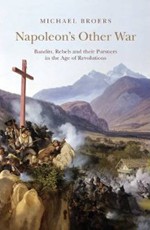From the publishers:
The wars of Napoleon are among the best-known and most exciting episodes in world history. Less known is the uproar the armies stirred up in their path, and even more, the chaos they left in their wake. The 'knock-on effect' of Napoleon's sweep across Europe went further than is often remembered: his invasion of Spain triggered the collapse of the Spanish Empire in Latin America, and his meddling in the Balkans destabilised the Ottomans.
Behind the battle fronts raged other conflicts, 'little wars' – the guerrilla (the term was born in these years) – and bigger ones, where whole provinces rose up in arms. Bandits often stood at the centre of these 'dirty wars' of ambushes, night raids, living hard in tough terrain, of plunder, rapine and early, violent death, which spread across the whole western world from Constantinople to Chile. Everywhere, they threw up unlikely characters – ordinary men who emerged as leaders, bandits who became presidents, priests who became warriors, lawyers who became murdering criminals.
In studying these varying fortunes, Michael Broers provides an insight into a lost world of peasant life, a world Napoleon did so much to sweep away.
Michael Broers is a Fellow of Lady Margaret Hall and a member of the History Faculty of the University of Oxford, and has been a Visiting Member at the Institute for Advanced Study, Princeton. He is the author of five books, including The Napoleonic Empire in Italy 1796-1814. Cultural Imperialism in a European Context? (2005), winner of the Prix Napoleon, 2006.
From napoleon.org:
Michael Broers' exceedingly useful book, Napoleon's Other War comes in the wake of recent attempts to flesh out the well-known big picture of Napoleonic Europe – the diplomatic and military glory boys deciding the fate of countries and continents. Karen Hagemann's three-year Anglo-German project (2004-2006) to establish a picture of the “Nations, Borders and Identities” of Napoleonic Europe laid the theoretical foundations for a comparative discussion of the 'experience' in the wider empire. In this book, Broers picks out the experience of bandits and rebels (building on fundamental discussions of disorder in books by Howard Brown and Marc Lafon). In style and format, it is aimed resolutely at the mainstream (and not just academic) reader, and the passionate prose carries all before it. And Broers' subject is not just France or Spain. One particular delight of this book is that it wanders much further a-field, to South America, the Balkans, Greece, and even to the mental space inhabited by the idea of the bandit/rebel in popular imagination. These figures who populated the revolutionary 'historical void' between the pre- and post-1815 worlds are painted in techni-colour and discussed with brio. A great read.
Peter Hicks, Paris, May 2010
Napoleon’s Other War: Bandits, Rebels and their Pursuers in the Age of Revolutions
Author(s) : BROERS Michael

- Year of publication :
- 2010
- Place and publisher :
- Oxford: Peter Lang
- Number of pages :
- 256

